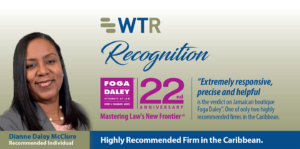The Trade Marks (Amendment) Act, which came into force on June 30, 2021, heralds a very new era for all trademark proprietors with interests in the Island of Jamaica.
The 2021 Act augmented the protection for nation branding by giving the Registrar power to impose conditions or limitations on trademarks containing Country names, maps, colours, emblems and symbols. Additionally, trademarks containing the Jamaican Coat of Arms, flag, emblems and other national symbols will be denied registration unless consent has been granted by the Government of Jamaica. The Act has also reinforced the government’s policy on the protection of traditional knowledge and traditional cultural expressions (albeit without defining these terms) by disallowing trademarks which misrepresent or misappropriate the traditional knowledge or traditional cultural expressions of indigenous or local communities in Jamaica.
Undoubtedly however, the ground-breaking development is the provision made in the Act for the international registration of marks through simultaneous filings in Madrid Protocol member countries as a precursor to Jamaica becoming a signatory to the international agreement. On December 27, 2021, only six months after the Act came into effect, Jamaica acceded to the Protocol.
For years, there has been much discussion and speculation about what being a Protocol Country will mean for Jamaica. Some have high expectations that the Protocol will make it easier and cheaper for local companies to protect their trademarks abroad and provide significant revenue for the Government of Jamaica in foreign trademark filings. Others have urged and cautioned a measured approached, recognising that the Protocol, while clearly beneficial to large brand owners, does not promise automatic international protection and is not a panacea for addressing trademark infringements globally. What is undisputed is that when the Protocol takes effect on March 27, 2022, businesses will have more trademark filing options with the Protocol and concurrently, the Jamaica Intellectual Property Office will experience an influx of international filings designating Jamaica.
Questions remain as regards to what extent local proprietors/businesses will utilize the system and the profile of the entities which will find the Protocol helpful. Also unknown is whether the incoming international filings will put such pressure on the national trademark system, resulting in protracted delays in the prosecution of national filings as has happened in some jurisdictions. Finally, will the local proprietors’ ability to defend their own marks in Jamaica, be impacted in any way by incoming filings?
Understandably, it may take several months to get some of these questions answered and brand owners should lean on skilled trademark practitioners as they navigate this new legal framework towards achieving their goals. What should be pellucid is that while the Madrid Protocol can fast-track portfolio expansion, it is not an end in and of itself. It is therefore imperative for Jamaican businesses to employ additional strategies to ensure proper management and preservation of their brands beyond an International Registration.
By Dianne Daley McClure, Intellectual Property Partner, Foga Daley
January 11, 2022




